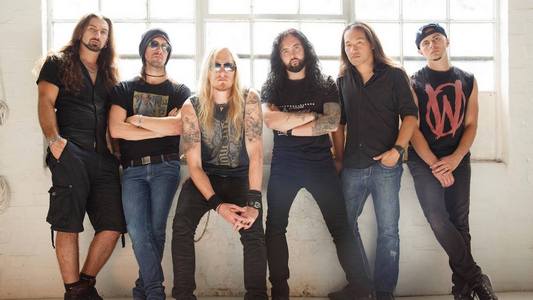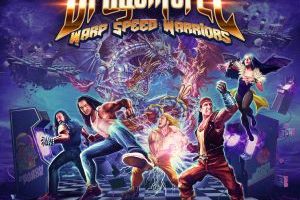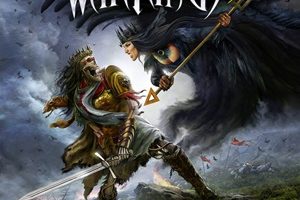Dragonforce – Reaching for the Next Step
Monday, 8th May 2017
Has there been enough time now where when the name Dragonforce is mentioned, Guitar Hero isn’t immediately thought of as well? Of course, a classic track like “Through the Fire and Flames” is going to stick with them regardless of outside influences (and for good reason). But as we’ve moved on from the plastic guitar/band craze, Dragonforce has been on a bit of an evolution of their own since 2012’s The Power Within.
The band’s upcoming seventh full-length, Reaching into Infinity, continues to see Dragonforce spread their wings. A fair number of surprises wait the listening public and longtime fans, yet still retaining that signature Dragonforce sound that many have grown fond of. To get a better understanding of both sides of this equation, we grabbed guitarist Herman Li to fill in the blanks.
Dead Rhetoric: You released the Killer Elite greatest hits double-album last year. Did you look at Reaching into Infinity as a fresh start or did it influence your writing?
Herman Li: I don’t think going through the old songs made much difference, before we record a new album I usually listen to the old albums anyway. Just to see what we’ve done and what is there that we can improve on.
Dead Rhetoric: Do you think that listening to the old songs helps to solidify the Dragonforce sound?
Li: Maybe. It’s good to remind yourself what you’ve done, so you don’t play the same solo again. Sometimes you might write something and you say, “Oh, I’ve done that before haven’t I?” It’s a good reminder of “we’ve sung ‘so far away’ before once, no twice, no three times.” [Laughs] It’s one thing that I do; Sam [Totman] does it as well.
Dead Rhetoric: You kept the same line-up from Maximum Overload, did that make you want to push harder to go for some new elements?
Li: We always try to put new elements in, since we started doing The Power Within. We were getting more diverse and adding more to it – it’s just a natural progression now that we do it. It’s almost kind of expected actually. We try to open up a little bit, and it actually helps when you are playing that you aren’t just doing the same thing again. It’s always difficult to play something that we’ve done – a soft song, a fast melodic catchy song – there’s only so many harmonies you can write sometimes.
Dead Rhetoric: You also returned to Jens Bogren for a second time – what made that a good choice for the band?
Li: It worked last time, and there was no reason not to do it again, because we learned something. We’d learned how to work with him last time, so we thought it would it would be even better. We know how things work for him and how we work. So we were able to develop that collaboration. Not that everything was done in the same way – it wasn’t just plain and easy, sailing through. At least that part, we knew we had some sort of connection that we know worked last time.
Dead Rhetoric: I know he pushed you a bit with Maximum Overload – did you get that same sense this time around?
Li: Yeah, he always does. It’s his job to get the most out of everyone [laughs]. That’s what we are paying him for.
Dead Rhetoric: Some of Marc’s vocals are much more brutal than they have been for the band. How much push did you give him to veer outside of his normal vocal range?
Li: I believe we all have to up our game, and that’s Marc [Hudson] showing more dynamics to his voice. Adding more aggressive sides, even the death metal vocals on the “The Edge of the World.” He does a lot of aggressive vocals there and then goes into the melodic stuff. We’re not really showing I guess, that we can do more than what we’ve done before, but it’s more of a self-fulfillment that we’ve gotten better and improved our own skills. It wouldn’t make sense to stay the same – you can’t make an album [that way].
Dead Rhetoric: You mentioned “The Edge of the World” – is that the longest song you’ve done for Dragonforce?
Li: I believe it is the longest. We have had 10-minute songs before, like “Soldiers of the Wasteland,” but I believe this is even longer. It’s over 11-minutes.
Dead Rhetoric: In terms of writing, did you approach it differently than your other songs?
Li: This one is quite different, it was written by our bass player Frédéric [Leclercq]. He wasn’t quite sure it was going to work for Dragonforce when he got it together. But we started playing it and it sounded like us, even though it was done differently than older Dragonforce songs. The other 10-minute song we did, it was a fast 10-minute song. This is a slower song.
Dead Rhetoric: Do you think some of these changes will surprise your fanbase when they hear the album?
Li: I’m not sure what can really surprise them. When we did the song “Cry Thunder” [from The Power Within], which was our first mid-tempo song, we made it the first single. They weren’t surprised, and I was so surprised that they weren’t surprised…because we said we’d never play a mid-tempo song. No one complained about it. Then when we did “The Game” [from Maximum Overload], which is even faster than our fastest song, people were complaining. Asking why it was so heavy and why it was so fast. It’s kind of weird – we play faster and people complain, but we play slower and no one complains. So we’ll see what happens! It’ll be interesting to see the feedback on some of these songs.
Dead Rhetoric: The artwork is pretty cool, to be honest – was there a concept you were trying to get across through it?
Li: Yeah, the artwork and the title…what we are trying to say with Reaching into Infinity – we call music infinite…we can reach people in all different ways, through different times. Good music doesn’t really go out of fashion. Fashion exists but music isn’t that way. The cover, with the energy field…I call it a wormhole. In physics, at least in theory, a wormhole takes energy in order to travel through time, and we are saying the music is timeless. Music is a good way to escape from the crazy world that you live in at the moment. You can put on the music and forget about everything. It’s about the importance of music these days.
Dead Rhetoric: In opposition to that, with some of your longer songs…do you think that there’s a push against that – people not having the attention span that they used to?
Li: Isn’t that too bad, eh [laughs]? Are we going to write music for people who can’t concentrate or change their mind or are we going to go for the music the way it should be done? That’s the answer from Dragonforce – never compromising. We haven’t made 3-4 minute songs or tried to get on the radio or fit in with anyone else.
Dead Rhetoric: Going back to things being faster and more brutal – what inspired the “Evil Dead” cover on the special edition?
Li: That was just to do something different and unexpected. I don’t think anyone expected us to do that way. The singing and everything is pretty different than what we’ve done. There’s a lot that the players in Dragonforce can do outside of Dragonforce, we just never show it. Gee [Anzalone] our drummer, for example, you can go to his YouTube channel and he plays Dream Theater and all kinds of stuff….from Dream Theater to Journey to death metal. The same thing for everyone. I guess now, we are getting more diverse and showing what we can do, beyond the original, fast Dragonforce sound. There’s still a lot that people don’t know what we can do. Some people just thought we were a bunch of drunks in the beginning [laughs].
Dead Rhetoric: Dragonforce has an immediately identifiable sound – do you feel it’s harder for younger bands to find a sound that works for them that’s unique?
Li: Finding a sound…you can’t really do it consciously, it just happens. Whether it’s playing a lot or listening to a lot of different kinds of music and not worrying about what you are doing – just picking up that riff and doing what you feel. Something will trigger that event that will create this original thing that you didn’t expect it to. It’s hard to chase an original sound I think – it might become unnatural and clinical.
With us, it just happened that way. We just put a blastbeat here and a double guitar solo – it wasn’t something that you heard melodic bands doing at the time. That was also because we listened to a lot of music. We didn’t just listen to the same music all together. We were all born from different cultures and different places, so we have a lot of diversity in the band, just in terms of knowledge. We do things differently, which may make some sort of impact…you can’t really calculate it. I’m guessing that the pieces and parts of us make it different.
Dead Rhetoric: Do you find more and more people that come up to you and cite you as an influence for playing guitar?
Li: Yeah, that definitely happens a lot. From being in IKEA to Home Depot, people come up to me in strange places. Once I went to get a car part and I just didn’t bother getting dressed…it was like I just got out of bed. I gave the guy at the register my card, and he says, “I know this name! Are you THE Herman Li? Can I take a photo?” I said yeah, even though I looked like total shit. I used to care a bit more when I looked like shit and maybe I shouldn’t take a picture…but they don’t care. No one cares, because we aren’t exactly going to be the sex symbols of anything, so who gives a shit [laughs]. I take photos looking like total shit nowadays, I don’t care.
Dead Rhetoric: With the band moving more towards 20 years of existence, what goals do you still want to see Dragonforce achieve?
Li: I think we have a good flow these days. We aren’t planning ahead musically. We’ve done world tours, we’ve played pretty much everywhere from small crowds all the way up. Countries change and scenes change as years go by. You can be big somewhere, like in America, and then you are big in Germany while the US goes down. We just go with the flow of what we do best. Whatever happens, happens. I remember Steve Vai’s wife telling me, “if you keep doing it, after a while it comes back to a circle and you become a legend. As long as you do it long enough.” So we’ll see if she’s right or not [laughs]!
Dead Rhetoric: Having toured around the world many times over, do you think in the last few years there’s been more of a resurgence in power/shred metal here in the US?
Li: I think the style has changed, in what shred represents in the US. There was the Shrapnel Records days, there was the ‘80s rock days…I’m not from the US, I wasn’t there, but from what I’ve read. Then all the grunge and nu-metal took over. I wouldn’t say we helped in some way, but we were part of the scene when solos came back. I’ve seen bands like Periphery and Animals as Leaders – that sort of prog/aggressive stuff. I saw Animals as Leaders recently in Los Angeles, and they had two support bands that were just doing solos and instrumental music. So I think it came back, but it was a different form that was created…but people are interested in guitar music again. It’s cool to even play solos in metal bands now. It wasn’t when we first started.
Dead Rhetoric: Your last major tour in the US was back with Kamelot [in 2015] right?
Li: Yeah, before that we hadn’t done a big US headlining tour for a long time.
Dead Rhetoric: So would you say that there’s anything particularly memorable that you recall?
Li: No [laughs]. Those guys were cool and it was good fun. I like Thomas Youngblood from Kamelot, he’s a smart guy. We had a good time. I have to say, after touring that long…a lot of these things that people ask, like “have you had this crazy experience on tour?” It’s not really that crazy after you see it a million times, but an outsider will come in and think it was absolutely insane. So it was just another tour – it had its moments, some crazy stuff in Vegas I think.
Dead Rhetoric: So what are your plans once Reaching into Infinity releases?
Li: We have some rehearsals to get ready for shows coming up. We have a bunch of shows before the album even comes out. We’ll do a world tour and wrap up most of the territories by the end of the year. We are putting the US before Europe this time – we did the other way last time.




























